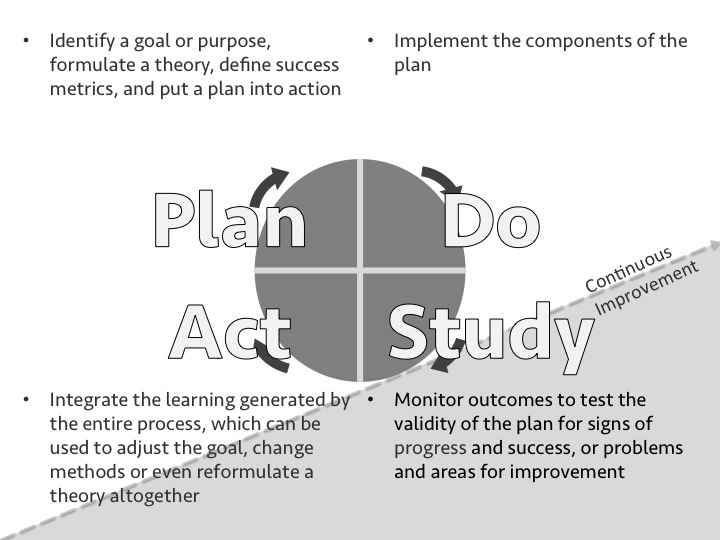Deming Research Seminar Review
 “W. Edwards Deming” by FDA licensed under Public Domain “W. Edwards Deming” by FDA licensed under Public Domain |
The 21st Annual International Deming Research Seminar was recently held at Georgetown University. Business leaders, consultants, teachers, students and many others came together to share stories of the continued research and application of Dr. W. Edwards Deming’s ideas in organizations around the world. Ethical Systems may be considered another one of those stories, for it is in much of the insights featured on our website that the works and teachings of Deming resound.
Here are some of Deming’s ideas, which are particularly relevant to our work at Ethical Systems:
Seen as the culmination of Deming’s work, this is a set of interrelated ideas, all of which must be applied together by management.
-
Appreciation for a system
This is an idea at the foundation of Ethical Systems, and can be found throughout our research pages. Through awareness and appreciation for a system, organizations gain a better understanding of how to approach the challenges they face, and can more easily uncover opportunities present within the systems in which they exist.
-
Knowledge of variation
Deming understood variation through statistical analysis. After determining that a system is a stable one, one can differentiate between what Deming called special and common cause variations. A common cause variation is inherent to the system and shows up in collected data within certain statistical limits on a control chart. Special cause variation lies outside those limits and can be attributed to external factors outside of the system, sometimes beyond the control of management. Failure by many businesses to display an understanding of the two different causes, relates to the “fundamental attribution error,” which is the tendency to attribute outcomes to personal factors or special causes, rather than to situational factors or common causes. This idea is mentioned in our Negotiation page and in one of our blog posts, and is discussed further in the books The Lucifer Effect and Switch.
-
 Theory of knowledge
Theory of knowledge
In the pursuit of knowledge, organizations must develop theories, test them, and modify them in a continuous and systematic way, as can be seen in the Plan, Do, Study, Act (PDSA) Cycle diagram. This PDSA Cycle diagram was made famous by Deming, though he credits it to his mentor Walter Shewhart. It is also known as the Plan, Do, Check, Act Cycle, but Deming asserted that Check connotes a mindless ticking off of a box on a checklist, rather than the deeper learning that Study connotes.
Adam Grant and others have pointed out the importance of this kind of thinking in the emerging era of big data, with the increasing capacity organizations have for data-driven, fact-based decision making.
-
Psychology
Those who contribute to Ethical Systems have an extensive backgrounds in this area. In fact, our goal of improving the ethical functioning of businesses relies on helping organizations better understand the growing body of psychological research as it pertains to business ethics.
Deming’s desire for organizations to understand how intrinsic motivation can be fostered, how to use incentives wisely and how to create an environment of trust is something that Barry Schwartz talks about in one of our #EthSys Insights videos on “Three Ways of Cultivating a More Ethical Climate in Organizations.”
Deming’s 14 Points for Management
-
Create constancy of purpose toward improvement of product and service, with the aim to become competitive and to stay in business, and to provide jobs.
Deming says, particularly in publicly traded companies, that this requires a resistance to a myopic, share-priced focus, which undermines constancy of purpose and leaves such a company vulnerable to a hostile takeover or leveraged buyout. Such an environment heavily pressures the kind of “short-termism,” which Deming decries and which Marc Hodak discusses in our Corporate Governance page.
-
Adopt the new philosophy. We are in a new economic age. Western management must awaken to the challenge, must learn their responsibilities, and take on leadership for change.
-
Cease dependence on inspection to achieve quality. Eliminate the need for inspection on a mass basis by building quality into the product in the first place.
-
End the practice of awarding business on the basis of price tag. Move toward a single supplier for any one item, on a long-term relationship of loyalty and trust.
-
Improve constantly and forever the system of production and service, to improve quality and productivity and thus constantly decrease costs.
-
Institute training on the job.
As Adam Grant points out in another of our #EthSys Insights videos on “Fostering Ethical Conduct,” and in his book Give & Take, research show that workers become more effective in carrying out their tasks when they have a connection to the end users who benefit from what they do. Deming also stresses a customer focus, and the importance of teaching the customers’ needs.
-
Institute leadership (see Point 12 and Ch. 8). The aim of supervision should be to help people and machines and gadgets to do a better job. Supervision of management is in need of overhaul, as well as supervision of production workers.
-
Drive out fear, so that everyone may work effectively for the company (see Ch.3).
This idea ties in with the idea of setting the stage for “psychological safety” that is discussed by Ann Tenbrunsel and Max Bazerman in our Decision Making page. In addition to working effectively, as Deming asserts, everyone may work more ethically.
-
Break down barriers between departments. People in research, design, sales and production must work as a team to foresee problems of production and in use that may be encountered with the product or service.
-
Eliminate slogans, exhortations, and targets for the workforce asking for zero defects and new levels of productivity. Such exhortations only create adversarial relationships, as the bulk of the causes of low quality and low productivity belong to the system and thus lie beyond the power of the work force.
a. Eliminate work standards (quotas) on the factory floor. Substitute leadership.
b. Eliminate management by objective. Eliminate management by numbers, numerical goals. Substitute leadership.
This parallels avoiding “measures management,” which Robert Bloomfield and David Hirshleifer suggests in our Accounting page.
-
Remove barriers that rob the hourly worker of his right to pride of workmanship. The responsibility of supervisors must be changed from sheer numbers to quality.
-
Remove barriers that rob people in management and in engineering of their right to pride of workmanship. This means inter alia, abolishment of the annual or merit rating and of management by objective (see Ch. 3).
-
Institute a vigorous program of education and self-improvement.
-
Put everybody in the company to work to accomplish the transformation. The transformation is everybody’s job.
Watch a video explaining the 14 Points, with an appearance from then Harvard professor Robert Reich:
Learn more about Deming, his works and his works in practice today:
-
Here is a brief documentary chronicling Deming’s life, and the development of his ideas:
-
Jim Benson is a very entertaining author, public speaker, and consultant who has been building upon Deming’s ideas, in part by helping organizations visualize their work.
-
Brian Mickelsen Gamble is a Canadian scholar whose presentation explained how Deming’s management style is tantamount to effectively managing for ethical behavior in organizations.
-
Bjarne Berg Wig is a Norwegian author, consultant, and lecturer who presented on how he has been applying Deming’s ideas in Scandinavia.
-
Loren Feldman covers entrepreneurship for Forbes, and led a number of panel discussion with some of the entrepreneurs he features in his writings who implement Deming’s teachings.
-
Tripp Babbitt is an author and consultant who has built a consulting firm named for a rule of thumb that Deming had taught to him that 95% of the performance of an organization is attributable to the system, while the other 5% is attributable to the individual.



